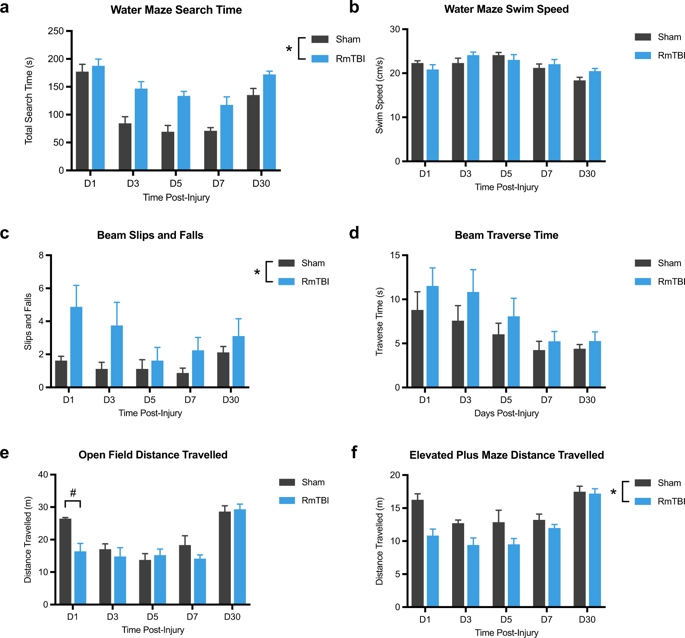Our official English website, www.x-mol.net, welcomes your
feedback! (Note: you will need to create a separate account there.)
Repeated mild traumatic brain injuries induce persistent changes in plasma protein and magnetic resonance imaging biomarkers in the rat.
Scientific Reports ( IF 3.8 ) Pub Date : 2019-10-10 , DOI: 10.1038/s41598-019-51267-w David K Wright 1, 2 , Rhys D Brady 1, 3 , Alaa Kamnaksh 4 , Jack Trezise 3 , Mujun Sun 1 , Stuart J McDonald 1 , Richelle Mychasiuk 1 , Scott C Kolbe 1 , Meng Law 1 , Leigh A Johnston 2, 5 , Terence J O'Brien 1, 3 , Denes V Agoston 4 , Sandy R Shultz 1, 3
Scientific Reports ( IF 3.8 ) Pub Date : 2019-10-10 , DOI: 10.1038/s41598-019-51267-w David K Wright 1, 2 , Rhys D Brady 1, 3 , Alaa Kamnaksh 4 , Jack Trezise 3 , Mujun Sun 1 , Stuart J McDonald 1 , Richelle Mychasiuk 1 , Scott C Kolbe 1 , Meng Law 1 , Leigh A Johnston 2, 5 , Terence J O'Brien 1, 3 , Denes V Agoston 4 , Sandy R Shultz 1, 3
Affiliation

|
A single mild traumatic brain injury (mTBI) typically causes only transient symptoms, but repeated mTBI (RmTBI) is associated with cumulative and chronic neurological abnormalities. Clinical management of mTBI is challenging due to the heterogeneous, subjective and transient nature of symptoms, and thus would be aided by objective biomarkers. Promising biomarkers including advanced magnetic resonance imaging (MRI) and plasma levels of select proteins were examined here in a rat model of RmTBI. Rats received either two mild fluid percussion or sham injuries administered five days apart. Rats underwent MRI and behavioral testing 1, 3, 5, 7, and 30 days after the second injury and blood samples were collected on days 1, 7, and 30. Structural and diffusion-weighted MRI revealed that RmTBI rats had abnormalities in the cortex and corpus callosum. Proteomic analysis of plasma found that RmTBI rats had abnormalities in markers indicating axonal and vascular injury, metabolic and mitochondrial dysfunction, and glial reactivity. These changes occurred in the presence of ongoing cognitive and sensorimotor deficits in the RmTBI rats. Our findings demonstrate that RmTBI can result in chronic neurological abnormalities, provide insight into potential contributing pathophysiological mechanisms, and supports the use of MRI and plasma protein measures as RmTBI biomarkers.
中文翻译:

反复的轻度脑外伤会诱发大鼠血浆蛋白和磁共振成像生物标记物的持续变化。
单个轻度创伤性脑损伤(mTBI)通常仅引起短暂症状,但重复性mTBI(RmTBI)与累积性和慢性神经系统异常有关。由于症状的异质性,主观性和短暂性,因此mTBI的临床管理具有挑战性,因此客观的生物标志物将有助于mTBI的临床管理。在RmTBI的大鼠模型中检查了有前途的生物标志物,包括先进的磁共振成像(MRI)和血浆中所选蛋白的水平。间隔5天时,大鼠遭受了两次轻度的液压打击乐器或假手术损伤。在第二次受伤后第1、3、5、7和30天对大鼠进行MRI和行为测试,并在第1、7和30天收集血样。结构和弥散加权MRI显示RmTBI大鼠的皮层有异常和体。血浆蛋白质组学分析发现,RmTBI大鼠的标志物异常,表明轴突和血管损伤,代谢和线粒体功能障碍以及神经胶质反应性。这些变化发生在RmTBI大鼠中存在持续的认知和感觉运动缺陷时。我们的发现表明,RmTBI可以导致慢性神经系统异常,提供潜在的潜在病理生理机制的见解,并支持将MRI和血浆蛋白检测方法用作RmTBI生物标记物。
更新日期:2019-10-10
中文翻译:

反复的轻度脑外伤会诱发大鼠血浆蛋白和磁共振成像生物标记物的持续变化。
单个轻度创伤性脑损伤(mTBI)通常仅引起短暂症状,但重复性mTBI(RmTBI)与累积性和慢性神经系统异常有关。由于症状的异质性,主观性和短暂性,因此mTBI的临床管理具有挑战性,因此客观的生物标志物将有助于mTBI的临床管理。在RmTBI的大鼠模型中检查了有前途的生物标志物,包括先进的磁共振成像(MRI)和血浆中所选蛋白的水平。间隔5天时,大鼠遭受了两次轻度的液压打击乐器或假手术损伤。在第二次受伤后第1、3、5、7和30天对大鼠进行MRI和行为测试,并在第1、7和30天收集血样。结构和弥散加权MRI显示RmTBI大鼠的皮层有异常和体。血浆蛋白质组学分析发现,RmTBI大鼠的标志物异常,表明轴突和血管损伤,代谢和线粒体功能障碍以及神经胶质反应性。这些变化发生在RmTBI大鼠中存在持续的认知和感觉运动缺陷时。我们的发现表明,RmTBI可以导致慢性神经系统异常,提供潜在的潜在病理生理机制的见解,并支持将MRI和血浆蛋白检测方法用作RmTBI生物标记物。































 京公网安备 11010802027423号
京公网安备 11010802027423号